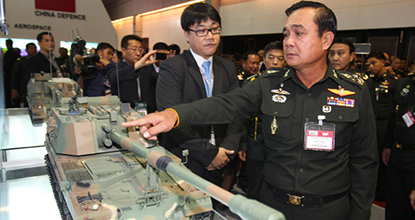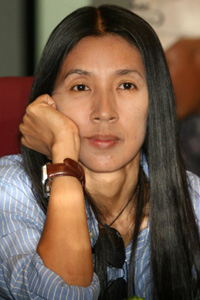
It remains unclear how the political crisis will eventually pan out.

Soldiers join the Trooping the Colour march to celebrate His Majesty the King’s birthday in Hua Hin, Prachuap Khiri Khan. The military has been facing increasing pressure to intervene to break the political impasse. PATTARACHAI PRECHAPANICH
But in fact, we can say that Suthep Thaugsuban and his People's Democratic Reform Committee (PDRC) have gained victory _ though partial _ in this so-called "people's revolution" because the protest succeeded in forcing Prime Minister Yingluck Shinawatra to dissolve the House of Representatives on Dec 9. The new election is scheduled to be held on Feb 2.
Yet we remain trapped in political deadlock as Mr Suthep still wants to overthrow the government and uproot the so-called "Thaksin regime", the protesters' term for ousted premier Thaksin Shinawatra's influence on Thai politics.
This can be done, he said, by invoking Section 7 of the charter which will pave the way for a non-partisan prime minister as head of a caretaker government.
As the power struggle unfolds, some observers note Mr Suthep may not have managed to come this far waging his brand of political warfare without support from the military.
In other words, some believe this is a discreet form of coup d'etat in which Privy Councillor Palakorn Suwannarat and former defence minister Gen Prawit Wongsuwon have emerged as candidates for the role of prime minister.
Gen Prawit is known as the "big brother" of the Burapha Payak (Tigers of the East) unit which is respected by army chief Prayuth Chan-ocha.
Gen Prawit was groomed as a tiger of the 2nd Infantry Royal Guard in Prachin Buri _ a position that secured his top ranking in the army.
The "discreet coup" speculation is based largely on the military's decision not to remain idle when anti-government protesters laid siege to government offices. More importantly, the military was said to have stepped in when the police resorted to heavy-handed tactics, bombarding protesters with tear gas.
Many also believe it was Gen Prayuth and the navy and air force commanders who arranged a meeting between Ms Yingluck and Mr Suthep on the night of Dec 1. Some speculated it was Gen Prayuth and Supreme Commander Gen Tanasak Pratimapagorn who made Ms Yingluck decide to dissolve the House during a private meeting. However, Gen Prayuth strongly denies these claims.
"The army did not force the prime minister to dissolve the House. She consulted us and merely let us know before she did it," Gen Prayuth said.
Observers, however, still believe Gen Prayuth was involved because he was close to Mr Suthep when he was deputy premier in the Democrat-led government.
Also, Gen Prayuth is a member of Tigers of the East with Gen Prawit and former army chief Gen Anupong Paojinda.
More rumours surfaced about a secret meeting between Mr Suthep and the three generals on Dec 10 at a military base, amid claims that Mr Suthep's group is backed by the army leader.
Again, Gen Prayuth strongly denied there was such a meeting, with reports that Gen Anupong was abroad, while Gen Prawit was confined to his home because of a minor illness.
Gen Prawit condemned the media for coming out with groundless reports, maintaining he had never thought of a coup or taking the role of prime minister.
Even though the military keeps saying it has learnt the lessons from the 2006 coup and insists it has no intention of getting involved in this political crisis, many people think otherwise.
"We never think about a coup. We have learnt the lessons. A coup will not solve any problem, it will lead to other problems. These is no place for our country in this world if we have a coup," said Gen Prayuth.
But it seems some people don't believe him. Pheu Thai spokesman Prompong Nopparit also mentioned Gen Prawit, Gen Anupong as well as former deputy army chief Gen Dapong Rattanasuwan, a former classmate of Gen Prayuth at the Armed Forces Academies Preparatory School, as Mr Suthep's supporters.
Red-shirt leader Jatuporn Prompan does not trust the army either. He made allegations that the army not only assigned officers to follow Pheu Thai and red-shirt leaders, but also gave the green light for soldiers to take part in the major rally on Dec 9.
The allegations reflect the lack of trust of the government and red-shirt leaders in the army, especially Gen Prayuth. The rumours about the military's role went viral on social media and seem to have further divided a society that is trapped in colour-coded politics.
The army's PR team said Gen Prayuth simply wanted the public to settle their differences through peaceful means and that he has tried to do what he could to ensure the rival parties settle their problems as quickly as possible.
It is therefore undeniable that Gen Prayuth still has something of a role in politics in his bid to end the conflict.
But is such a role appropriate? The military would respond that it's better than staging a coup that is likely to lead to a bloody confrontation with the red shirts or anti-coup groups. And the problems remain unsolved.
Given the political impasse, the military's discreet role, which has been described by critics as a "silent coup", seems to be the best option available.
Wassana Nanuam is a senior news reporter covering military affairs for the Bangkok Post.

